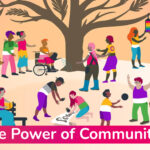What is Transphobia?
The word Transphobia refers to the range of negative attitudes, behaviours, and systemic inequalities directed at transgender people, or those who do not conform to traditional gender norms (including cis people*). It manifests in numerous ways, including discrimination in healthcare, employment, housing, harassment or violence. It’s the deliberate use of incorrect names or pronouns, and the exclusion of trans individuals from spaces such as bathrooms (toilets), sports, or social communities.
At its core, transphobia is rooted in the belief that cisgender identities; that is, identities where one’s gender aligns with the sex assigned at birth, are more legitimate or acceptable, than transgender identities.
A common misunderstanding about transphobia lies in the interpretation of the word itself. Many argue, “I’m not scared of trans people, so I’m not transphobic.” This view hinges on the literal meaning of the suffix “-phobia” as a fear, but this is a misreading of its well-established social use.
In contexts such as transphobia, homophobia or xenophobia, the term describes a deeper aversion or hostility, often irrational and systemic, rather than a personal fear. Transphobia involves a broad spectrum of prejudice, discomfort, and discriminatory behaviour, often embedded in cultural norms and institutional practices, whether individuals feel they are “afraid” of transgender people, or not.
The effects of transphobia on society are profound and damaging. On an individual level, though, transgender people frequently face significant harm to their mental and physical health. Not because trans people are innately mentally ill, but because constant transphobia causes severe mental health problems.
Experiences of rejection, harassment, and violence contribute to disproportionately high rates of anxiety, depression, and suicide. Access to quality healthcare, particularly gender-supportive care, remains a significant challenge in many regions, further compromising well-being.
Beyond the personal toll, transphobia represents a loss to society as a whole. When transgender individuals are excluded from education, workplaces or public life, their talents, and contributions are suppressed. This undermines innovation, diversity of thought, and social progress.
A society that marginalises people on the basis of identity, inevitably fractures its social cohesion, sowing division and mistrust. Moreover, the normalisation of discrimination against one group opens the door for broader erosions of human rights. Laws or policies targeting transgender people often create precedents that can later be used to restrict the freedoms of others.
Perhaps most worryingly, transphobia contributes to environments where violence and aggression, becomes not just more likely but, in some cases, tacitly accepted. The rise in anti-trans hate crimes and the reluctance of some institutions to intervene, speak to the broader danger of ignoring or excusing prejudice.
Addressing transphobia requires a collective commitment to societal education, empathy, and understanding of our lived experiences. Learning about gender diversity, its history, and the lived experiences of transgender people is a critical starting point. Challenging myths, correcting misinformation, and promoting respectful dialogue can shift public perceptions.
Speaking out against transphobic language, behaviour, or policy, whether in personal conversations or in public forums, while difficult, is vital. Silence frequently feels like consent for prejudice, to those using it. The positive words and actions of individuals; but especially allies, can dismantle that quiet consent that perpetuates transphobic harm to gender diverse people in our societies.
Respecting people’s names and pronouns, advocating for inclusive policies, and supporting trans-led organisations all contribute to a more just society. Equally, creating safe and affirming environments, in schools, workplaces, communities, and homes, can make a real difference in the lives of trans individuals.
Ultimately, the fight against transphobia is not just about protecting one group. It is about building a society where everyone, regardless of their gender identity or expression, can live with dignity, safety and respect. In doing so, we all benefit from a culture that values diversity, nurtures potential, and defends the human rights of all its members.
*transphobia can negatively affect cis people too, but especially cis women. Because transphobia is a prejudice, based on outdated ideals of what it means to be a woman or a man, cis people can fall foul of this prejudice when they themselves do not conform to certain ideals.
There have been reports of women with short hairstyles, dressing more masculine or feminine than they are supposedly supposed to, or just did not conform to specific ideals of beauty or masculinity. They have been attacked, accosted, shouted at, or even dragged out of toilets by security guards.
In fact, cis people might be subject to this kind of bigotry, just as much as trans people, given how small a percentage of the population we really are. Just because someone is not trans, it does not mean they will definitely not fall foul of transphobic attitudes, and hate.











